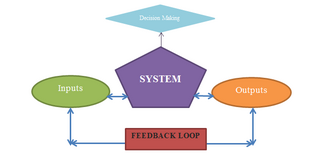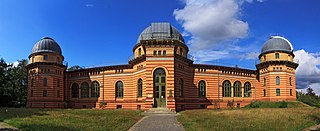
Ecological economics, bioeconomics, ecolonomy, eco-economics, or ecol-econ is both a transdisciplinary and an interdisciplinary field of academic research addressing the interdependence and coevolution of human economies and natural ecosystems, both intertemporally and spatially. By treating the economy as a subsystem of Earth's larger ecosystem, and by emphasizing the preservation of natural capital, the field of ecological economics is differentiated from environmental economics, which is the mainstream economic analysis of the environment. One survey of German economists found that ecological and environmental economics are different schools of economic thought, with ecological economists emphasizing strong sustainability and rejecting the proposition that physical (human-made) capital can substitute for natural capital.

Environmental policy is the commitment of an organization or government to the laws, regulations, and other policy mechanisms concerning environmental issues. These issues generally include air and water pollution, waste management, ecosystem management, maintenance of biodiversity, the management of natural resources, wildlife and endangered species. For example, concerning environmental policy, the implementation of an eco-energy-oriented policy at a global level to address the issues of global warming and climate changes could be addressed. Policies concerning energy or regulation of toxic substances including pesticides and many types of industrial waste are part of the topic of environmental policy. This policy can be deliberately taken to influence human activities and thereby prevent undesirable effects on the biophysical environment and natural resources, as well as to make sure that changes in the environment do not have unacceptable effects on humans.
The Global Scenario Group (GSG) was an international, interdisciplinary body convened in 1995 by the Tellus Institute and the Stockholm Environment Institute (SEI) to develop scenarios for world development in the twenty-first century. Further development of the Great Transition scenarios has been carried on by the Great Transition Initiative (GTI).
The planetary phase of civilization is a term created by the Global Scenario Group (GSG) to describe the contemporary era in which increasing global interdependence and risks are binding the world into a unitary socio-ecological system. Characteristics of this phase include economic globalization, biospheric destabilization, mass migration, new global institutions, the Internet, new forms of transboundary conflict, and shifts in culture and consciousness.

The Tellus Institute is an American non-profit organization established in 1976 with the aim of bringing scientific rigor and systemic vision to critical environmental and social issues. Tellus has conducted thousands of projects throughout the world, and now focuses on the global future and how to shape it.
The Stockholm Environment Institute (SEI) is an international research organization focusing on the issue of sustainable development. SEI has its headquarters in Stockholm with a network structure of permanent and associated staff worldwide and with centres the US, York (UK), Oxford (UK), Tallinn (Estonia), and Bangkok (Thailand).
Great Transition is used by the Great Transition Initiative and its predecessor, the Global Scenario Group (GSG), to describe a vision of a just and sustainable global future. The term was originally coined by Kenneth E. Boulding in The Meaning of the 20th Century – The Great Transition (1964) and describes the shift from pre-modern to post-modern culture, and the four possible courses of action that these organizations believe will allow humanity to successfully manage the Great Transition.

Regenerative design is an approach to designing systems or solutions that aims to work with or mimic natural ecosystem processes for returning energy from less usable to more usable forms. Regenerative design uses whole systems thinking to create resilient and equitable systems that integrate the needs of society with the integrity of nature. Regenerative design is an active topic of discussion in engineering, landscape design, food systems, and community development.

The following outline is provided as an overview of and topical guide to sustainability:
This page is an index of sustainability articles.

Sustainability is a social goal for people to co-exist on Earth over a long time. Specific definitions of this term are disputed and have varied with literature, context, and time. Experts often describe sustainability as having three dimensions : environmental, economic, and social, and many publications emphasize the environmental dimension. In everyday use, sustainability often focuses on countering major environmental problems, including climate change, loss of biodiversity, loss of ecosystem services, land degradation, and air and water pollution. The idea of sustainability can guide decisions at the global, national, and individual levels. A related concept is sustainable development, and the terms are often used to mean the same thing. UNESCO distinguishes the two like this: "Sustainability is often thought of as a long-term goal, while sustainable development refers to the many processes and pathways to achieve it."

The Potsdam Institute for Climate Impact Research is a German government-funded research institute addressing crucial scientific questions in the fields of global change, climate impacts, and sustainable development. Ranked among the top environmental think tanks worldwide, it is one of the leading research institutions and part of a global network of scientific and academic institutions working on questions of global environmental change. It is a member of the Leibniz Association, whose institutions perform research on subjects of high relevance to society.

Environmental issues are disruptions in the usual function of ecosystems. Further, these issues can be caused by humans or they can be natural. These issues are considered serious when the ecosystem cannot recover in the present situation, and catastrophic if the ecosystem is projected to certainly collapse.

Planetary boundaries are a framework to describe limits to the impacts of human activities on the Earth system. Beyond these limits, the environment may not be able to self-regulate anymore. This would mean the Earth system would leave the period of stability of the Holocene, in which human society developed. The framework is based on scientific evidence that human actions, especially those of industrialized societies since the Industrial Revolution, have become the main driver of global environmental change. According to the framework, "transgressing one or more planetary boundaries may be deleterious or even catastrophic due to the risk of crossing thresholds that will trigger non-linear, abrupt environmental change within continental-scale to planetary-scale systems."
Stanislav Edward Shmelev is an ecological economist affiliated with the International Society for Ecological Economics (ISEE). He currently holds several directorial positions at non-governmental organizations and consults with the UN Development Programme. He has been a Visiting Professor at the Universities of Torino, University of Geneva, Paris Dauphine, Sciences Po Caen, National University of Colombia, Kazakh National University and lectured at the University of St. Gallen, University of Edinburgh, University of Buckingham, and is the author of multiple books and articles on sustainability and ecological economics.
Transition scenarios are descriptions of future states which combine a future image with an account of the changes that would need to occur to reach that future. These two elements are often created in a two-step process where the future image is created first (envisioning) followed by an exploration of the alternative pathways available to reach the future goal (backcasting). Both these processes can use participatory techniques where participants of varying backgrounds and interests are provided with an open and supportive group environment to discuss different contributing elements and actions.

Carl Folke, is a trans-disciplinary environmental scientist and a member of the Royal Swedish Academy of Sciences. He is a specialist in economics, resilience, and social-ecological systems, viewing such systems as intertwined and potentially unexpected in their interactions. As a framework for resource management, this perspective brings important insights to environmental management, urban planning, and climate adaptation. He suggests ways to improve our ability to understand complex social-ecological interactions, deal with change, and build resilience, often working at smaller scales as a step towards addressing larger scales.
The global citizens movement is a constellation of organized and overlapping citizens' groups seeking to foster global solidarity in policy and consciousness. The term is often used synonymously with the anti-globalization movement or the global justice movement.
Natural capital accounting is the process of calculating the total stocks and flows of natural resources and services in a given ecosystem or region. Accounting for such goods may occur in physical or monetary terms. This process can subsequently inform government, corporate and consumer decision making as each relates to the use or consumption of natural resources and land, and sustainable behaviour.










